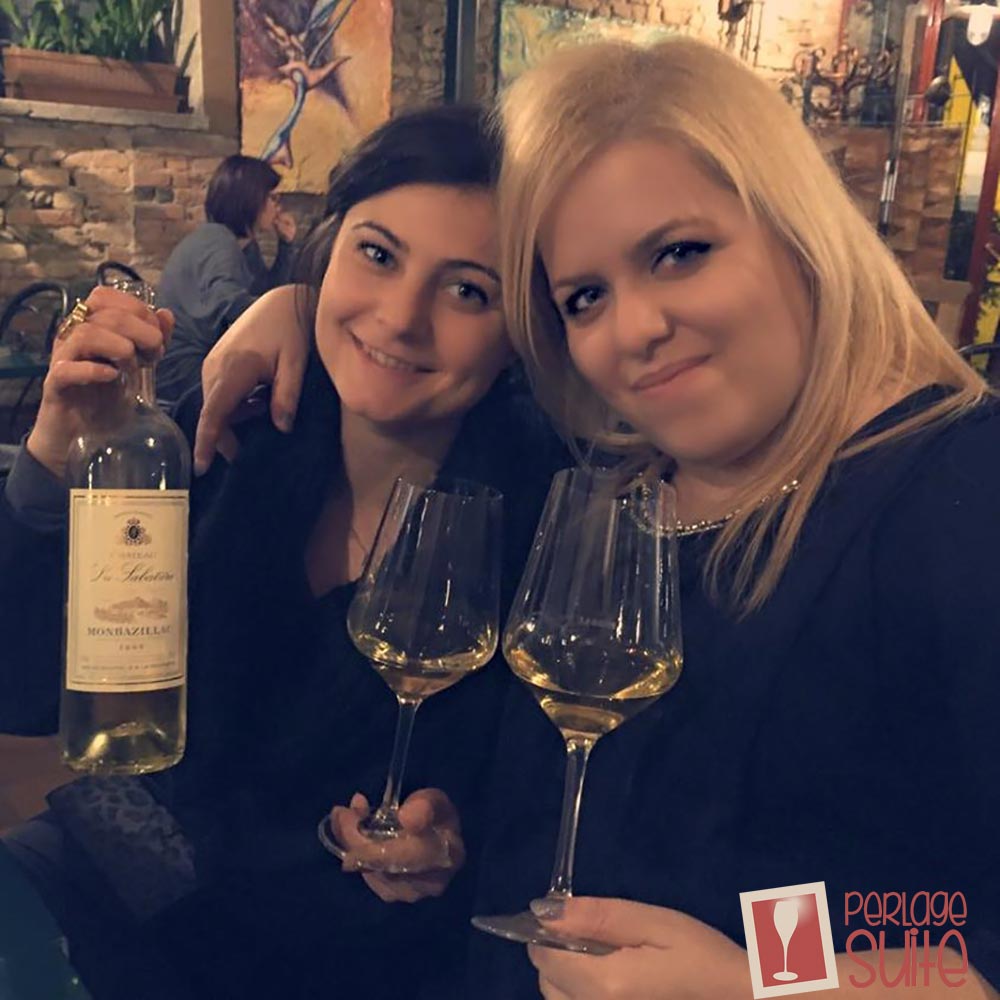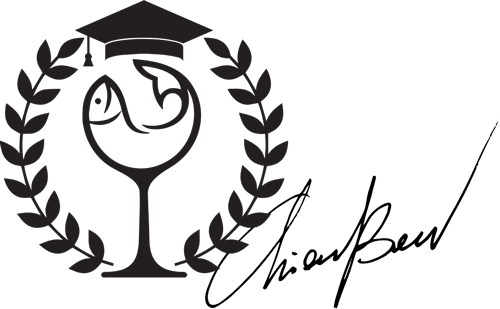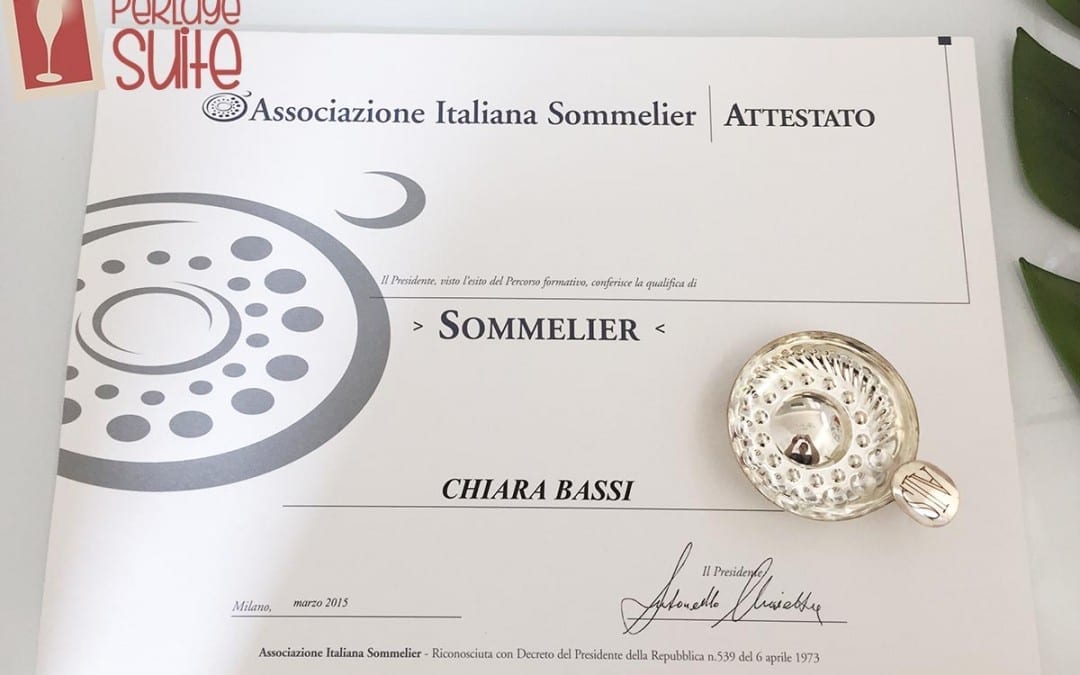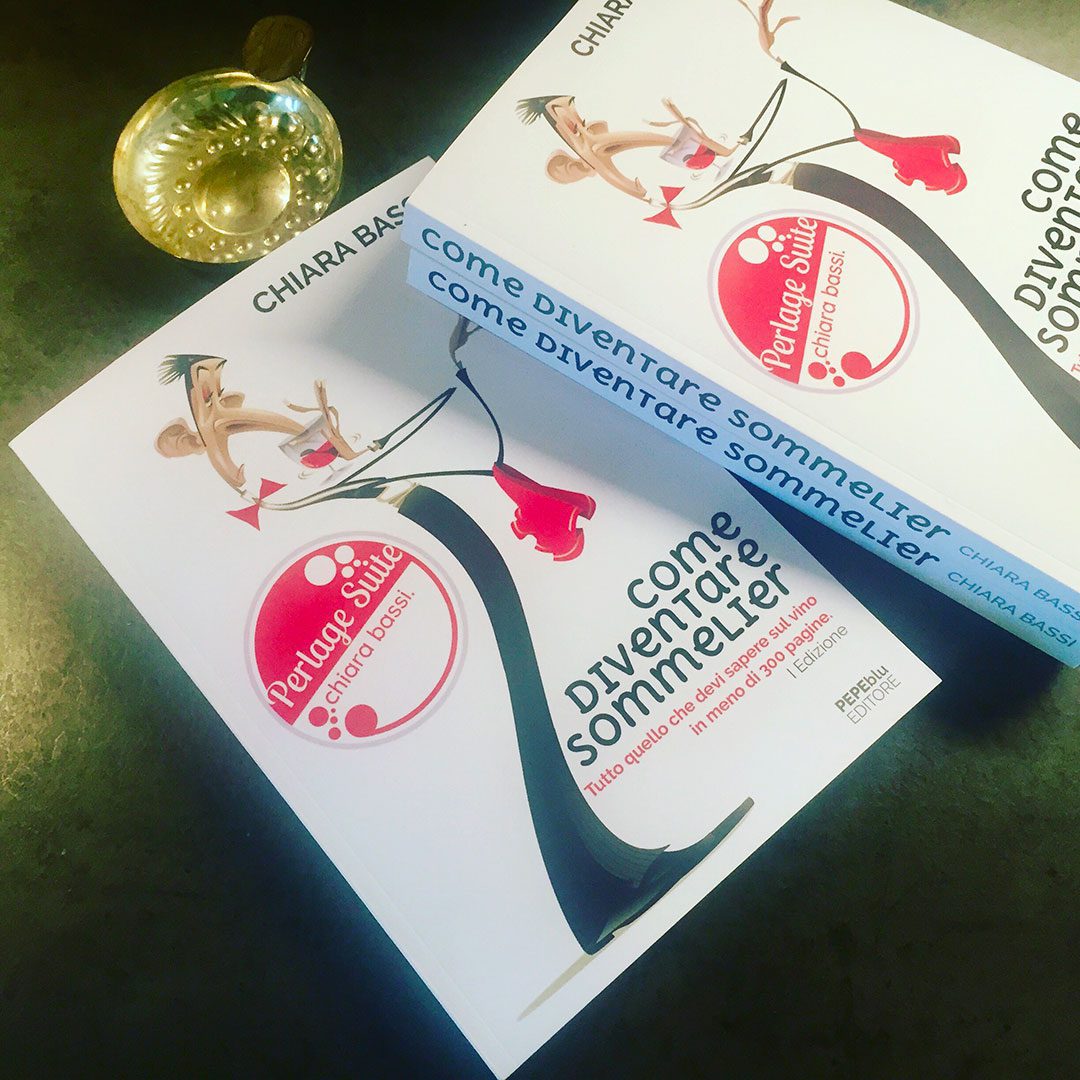Facebook has for some time now been displaying 'Memories', i.e. reproposing old posts that you have published on the platform in previous years. Today it reminded me of this photo, taken at the La Baita wine shop in Faenza, a delightful little place... where I returned just a few days ago with dear (still a little 'poor') Andrea (if you want to understand why I call him that, read Dinner, wine and the Japanese medlar )... for a lunch of a decent Valpolicella and a delicious selection of mostly blue cheeses, a wonderful strolghino di culatello, a good Tuscan crudo and lots of piadina with lots of homemade lard that I count among the best I've ever eaten! This photo, on the other hand, was taken just a few days after the exam....

Every day I receive so many e-mails from readers anxious about thethird level examination to become an AIS Sommelier. Some people ask me for advice on pass the exam and become a sommeliersome people ask me for the AIS examination questionssome ask me how long it takes to pass the exam, some ask me what he has to study... and lately I have also been receiving e-mails from Level 1 trainees who are super nervous about the self-assessment form. That's why I decided to write this article, which contains the 3 mantras I love to repeat to myself when 'performance anxiety' takes hold of me.
1. ALWAYS AIM FOR TOP MARKS.
There is one thing I have been telling myself since my university days:
If, when preparing for an exam, you aim for a 30, you are unlikely to fail. Of course you can get an honours or stop at a 25, but I have never known a single student who had given the maximum who flunked. If, on the other hand, you aim for the minimum, you may pass the exam with a meagre 18 or fail.
What is the moral of this? That if you study to make a good impression, you will certainly pass the exam and become a sommelier. Similarly, if you take it lightly, it is easy to get 'screwed'. And if this seems trivial to you, know that it is not trivial at all. The exam to become a sommelier is graded in hundredths, the written test takes 50/100. if you aim for 50 you are unlikely to fail, but if you aim for the minimum, being failed is easy!
[tweetshare tweet="Before asking yourself how much you have to study, ask yourself who you want to be." username="PerlageSuite"]
This advice applies not only to the sommelier exam, but to everything you do in your life:
"Become a #SognatoreInverso! Try living your ideal day, and imagine exactly who you would like to be, where you would like to live, what you would like to have. Then figure out exactly what and how much you need in terms of output to be able to achieve your goal. Now you can estimate how much effort you will have to put in to achieve that result that will guarantee you your goal. Live your dreams backwards."
.
2. PERFECTION DOES NOT EXIST.
I know this title may sound strange, especially since I just said in point number 1 that you have to aim for the maximum... but you do! Get one thing into your head: no matter how much you study, you will never know everything. Really, wine is a boundless world, and there is no one who knows everything about it... and you can study the 2000 or so pages that make up the books of the AIS 3-level course, but there is an ever-changing universe with hundreds of thousands of galaxies (read wines)... and you can always get something wrong or stumble upon the subject you know nothing about (Exactly what happened to me... see 2015 AIS exam questions & answers o pass the AIS examination and become a sommelier and you will find that I didn't know everything either, in fact to this day I still have several gaps that I am studying to overcome! But at least on the New Zealand by now I am well versed... 😀 ). This 'downsizing' of the preparation expectation helps a lot in the pre-exam phase! When I went to take the oral exam with Laura, she was totally in the stress phase. This is because she always has a lot of performance anxiety and procrastinates all the time because she is always afraid of not knowing enough. The truth is that this attitude is wrong and highly unproductive: at the beginning Perlage Suite was not as you see it now, and probably if you've been following me for a while you've picked up on the improvement I've made in organising things... (By the way, I've temporarily suspended the itineraries and the club today... because I've just made a major partnership for all the wine cellars and these two pages will be completely redesigned on this new project! But for now it's a secret 😉 ) Perlage Suite was born just as I was studying to become an AIS sommelier (by the way, in a few days it's exactly one year since I became a sommelier!!! And it's also Perlage Suite's birthday... so to pay homage to this very important double anniversary I will choose some wonderful food and wine realities and I will taste and write until my fingers (and my liver) cry out no more! 😀
Anyway, the point of this speech is: don't wait until you know everything to try (I myself when I started this blog was studying to pass the exam... and it was called Corkscrew! I changed my name and am waiting for graduation day...)!
When you stop chasing after a perfection that you will not be able to achieve, but you will still have aimed for the highest grade, you will certainly achieve extraordinary results. You just have to trust yourself!
.
3. CREATE NEW RESULT-ORIENTED HABITS
Did you know that you work like a dog? Now that may sound like a provocation, but it's not like that at all. What I mean to say is that we too are 'simple' like our favourite puppies and function exactly like them when it comes to learning a new habit... try it to believe it!
The result, i.e. in our case passing the AIS exam and becoming a sommelier, is achieved if we implement a series of small habits (in case we don't already have them). For me, for example, there were three habits that led me to pass the exam:
- Waking up 1 hour earlier every day to study a course topic;
- Making an intelligent shopping list for the result: that is, I go shopping 2 times a week, each time I choose a region (e.g. Emilia-Romagna) and buy 3 hard, semi-hard or soft cheeses, with a flowered rind or other, 1 sliced and 2 bottles of wine, 1 DOC and 1 DOCG. Choosing which wine to buy still obliged me to 'discover/study' the DOCs and DOCGs of that region... and partly because I had made a choice, partly because seeing them on the wine shop/supermarket shelf helped my photographic memory... in the end I remembered enough!
- Have a small aperitif every day in the company (possibly of those who have yet to take the exam and those who have already taken it), drink 1 glass of wine and make the food and wine pairing sheet;
Then I confess... I started point 3 'late' and I wasn't well prepared for all the regions... but if I had started it now I would have known many more DOC and DOCG... which I don't know about you, but for me they were the real monster! I don't have a great memory for names, but I have a very good photographic memory! I remembered the labels and the shelf with Toscana written on it... because I always went to the same place to get them! Try it 😉 And then the great thing about this method is that in the end you don't spend any particular money: you have to eat something! In particular, I used to use the things I bought in step 2 to make step 3, so I optimised costs and benefits... and we could even split the cost of the shopping (as long as we went to do it together so that everyone could remember it)!
And what does it have to do with the fact that we function like dogs? Simple: every action we take is the result of a habit we have acquired over the years. That is why the 3 habits that helped me pass the AIS exam and become a sommelier I had to 'learn' just like everything else I do on a daily basis. How?
For example, I am literally crazy about chocolate, but I try to diet a little. So every time I get up at the appointed time in the morning (8 o'clock in my case... I'm used to going to bed very late for work and luckily, as a freelancer, I can organise my day) I reward myself with a cube of chocolate. For this gesture to be really effective it is FUNDAMENTAL that the reward is positive, continuous and immediately following the correct action. And that is exactly what I do with Paco, every time I get him used to peeing in a new place or teach him a new word to which he has to respond! If he does what I ask him to do well, I immediately give him his favourite biscuit... and I do this until it is a habit to respond to the command (at which point the biscuit is no longer needed!)... to guarantee the result, when I stop giving him the biscuit every time because he is already used to it (it would be uneconomical and unhealthy to give him a biscuit every time I tell him "sit"... and if I ate a square of chocolate for every thing I did right I would roll even more 😇😁) I give him the biscuit only after a series of times he does the right behaviour! This generates in him the possibility of receiving the biscuit and so he always does the right thing in the hope that it will be the right time!
And my brain works in exactly the same way!
In summary:
- Always aim for top marks: if you aim for 50 in the written test, you will hardly fail!
- Don't aim to be perfect: you can't know everything! So don't be afraid to make mistakes and always try!
- Acquire habits that help you study and remember the topics that are most difficult for you... in the meantime you can try mine 😉
And buy this WINE JOURNAL - MOLESKINEIt will be a godsend to remind you of the tastings and wine sheets you do. I know we are in the digital age... but to me, writing it 'by hand' helps so, so much more! Try it yourself 😉
😍 Did you know that my new book on everything you need to know about wine in less than 300 pages is out?
💌 Every day I receive emails from aspiring sommeliers and enthusiasts asking me for help to study consistently. It is you who inspired me to produce this book, of which I am deeply proud.
🎓 I created this wine handbook to share my years of study and work and to help all aspiring sommeliers realise their career path and become sommeliers.
🍷 The manual is designed for all aspiring sommeliers, but is also very useful for 'already sommeliers' who want to brush up or for winelovers who want to start giving their passion a concrete foundation!
📝 It is not a substitute for the beautiful textbooks, which are absolutely a pleasure to leaf through and study, but a 'notebook' on which to highlight, underline and write... to fix topics in your head!
📕 Exactly the same size as your iPad or Tablet (but a bit thicker), it's super convenient to carry with you wherever you want to study/review!
💪 Ah, it's also perfect for all restaurateurs who want to give their wait staff a little training in preparation for their eventual sommelier courses!
✅ Buy it now on my website on launch offer CLICK HERE!
Good study and... get the wolf drunk!
See you soon and a hug,
Chiara
P.S. if you liked the article, share it with your friends: you will help them study and make my blog known!
P.P.S. and before or after the exam... consult these 9 wine-themed gifts for sommeliers and winelovers 😉
Can you write me in a comment your habits to pass the exam?


